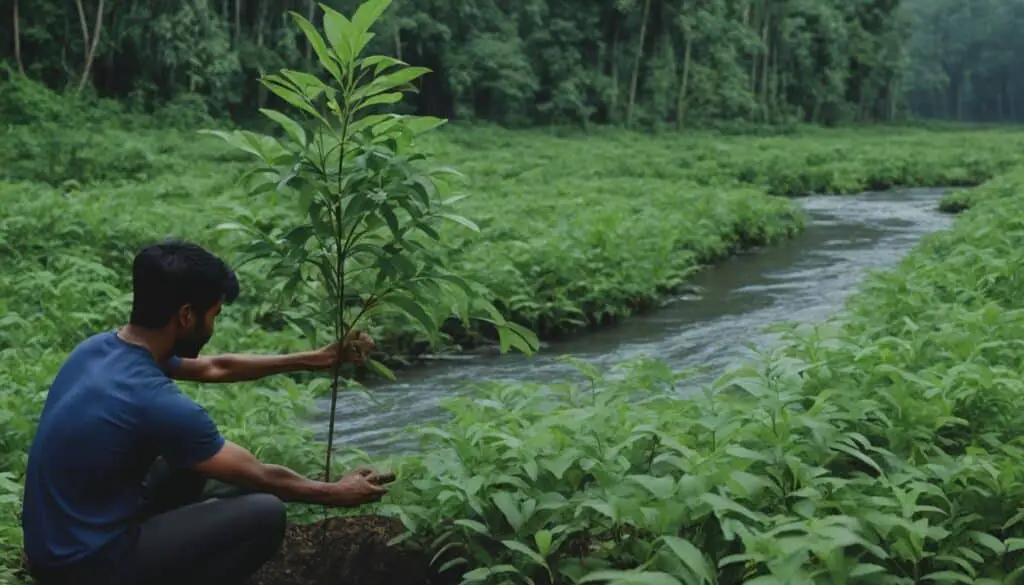
As we navigate the complexities of the modern world, it is essential to draw wisdom from various sources. One often overlooked but rich resource for guidance on environmental stewardship and care is the Bible. Embedded within its teachings are principles that emphasize our responsibility to protect and preserve God’s creation. Through the lens of biblical teachings, we can gain valuable insights into our role as custodians of the environment.
The Bible reminds us that the Earth is not merely a product of random chance, but rather a deliberate creation of God. In the book of Genesis, we are reminded of God’s sovereignty in creating the Earth and everything in it, including us. This understanding underscores the inherent value and sacredness of the Earth, compelling us to treat it with care and respect.
Humanity has been entrusted with the role of stewards, responsible for the well-being of the Earth and all its inhabitants. This stewardship encompasses not only the physical environment but also extends to the preservation of biodiversity and showing kindness to animals. As stewards, we are called to cultivate the Earth and exercise wise and sustainable management of its resources.
Caring for God’s creation involves more than just surface-level changes. It requires us to adopt sustainable practices, reduce waste, and advocate for justice. Environmental degradation often impacts the most vulnerable members of society disproportionately. By caring for the environment, we also demonstrate our concern for the welfare of those who are affected the most.
When we consider environmental stewardship, we must also think about the future generations who will inherit the Earth. The choices we make today have far-reaching consequences for tomorrow. By embracing responsible environmental practices, we leave a legacy of care and sustainability for our children and grandchildren to inherit.
The Bible offers examples of individuals who embodied environmental stewardship. Noah, for instance, was entrusted with the task of caring for and preserving all species of animals during the flood. This narrative serves as a reminder of our shared responsibility to safeguard and protect the natural world. Other passages highlight the importance of land preservation and the regenerative power of nature.
By integrating biblical teachings into our lives, we can become active participants in environmental stewardship. From reducing our carbon footprint to advocating for sustainable policies, we have the ability to make a positive impact on the world around us. Let us embrace our role as stewards and work towards creating a sustainable, thriving planet for ourselves and future generations.
Key Takeaways:
- Biblical teachings emphasize the importance of environmental stewardship and care.
- The Earth is seen as God’s creation, emphasizing its value and sacredness.
- Humanity is entrusted with the role of stewards, responsible for cultivating and preserving the Earth and its resources.
- Caring for creation involves sustainable practices, reducing waste, and advocating for justice.
- Our environmental choices today impact future generations, highlighting the need for long-term thinking.
The Earth as God’s Creation
According to the Bible, the Earth is described as God’s creation. The book of Genesis emphasizes that God created the Earth and everything in it, including humans, with a specific purpose. This highlights the sacredness and value of the Earth, promoting the idea of stewardship and careful management of its resources.
Humanity’s Role as Stewards
The Bible teaches that humanity has been entrusted with the role of stewardship over the Earth. In various passages, humans are instructed to care for and cultivate the Earth, being responsible stewards of its resources. This includes taking care of the environment, treating animals with kindness, and preserving biodiversity.
One key passage that highlights humanity’s role as stewards is found in Genesis 1:28, where God commands Adam and Eve to “fill the earth and subdue it.” This instruction implies a responsibility to care for the Earth and its inhabitants, using its resources wisely and sustainably.
Furthermore, the Bible emphasizes the interconnectedness of all creation and humanity’s role in maintaining harmony. In Psalm 8:6-8, the psalmist declares, “You made [humanity] rulers over the works of your hands; you put everything under their feet: all flocks and herds, and the animals of the wild, the birds in the sky, and the fish in the sea.” This passage underscores the immense responsibility entrusted to humans to care for and protect God’s creation.
The role of stewards requires us to be mindful of how our actions impact the environment and to actively work towards its preservation. It is our duty to protect the natural world, foster sustainable practices, and advocate for the well-being of all living beings.
By adopting a stewardship mindset, we recognize that we are not owners of the Earth but rather caretakers entrusted with its well-being. This perspective enables us to make informed choices that prioritize the long-term health and sustainability of the planet.
As stewards, we are called to act with wisdom and compassion, considering the implications of our actions on the Earth and future generations. This includes promoting ethical and sustainable practices, such as reducing waste, conserving energy, and supporting initiatives that protect the environment.
“The Earth is the Lord’s, and everything in it, the world, and all who live in it.” – Psalm 24:1
Embracing our role as stewards of the Earth is not only a biblical mandate but also an essential aspect of our responsibility towards future generations. By nurturing and preserving the environment today, we ensure a better tomorrow for all humanity.
Examples of Environmental Stewardship in the Bible
The Bible provides numerous examples of individuals who practiced environmental stewardship, setting an example for future generations to follow.
- Noah: In Genesis 6-9, Noah diligently followed God’s instructions to build an ark and preserve all species of animals during the great flood. This act demonstrates Noah’s commitment to caring for God’s creation and preserving biodiversity.
- Joseph: Through his wisdom and leadership, Joseph implemented sustainable farming techniques in Egypt during the famine, ensuring the preservation of natural resources and securing a future food supply for the people.
- Jesus: Although primarily known for his teachings on love and redemption, Jesus also displayed a deep appreciation for the natural world. He often used examples from nature as metaphors to convey profound spiritual truths, highlighting the interconnectedness of humanity and the environment.
These examples serve as a reminder that environmental stewardship is not a new concept but rather a timeless principle rooted in biblical teachings. They inspire us to follow their lead and make conscious choices that align with our responsibility to care for God’s creation.
Caring for Creation
Biblical teachings emphasize the importance of caring for God’s creation. It is our responsibility to ensure the well-being of our environment and the natural world through sustainable practices and a mindset of stewardship. By actively engaging in actions that demonstrate our caring for creation, we can contribute to a more balanced and harmonious relationship with the Earth.
Sustainable living is a key component of caring for creation. It involves making conscious choices in our day-to-day lives that minimize our impact on the environment. This can include reducing waste, conserving energy and water, choosing eco-friendly products, and practicing responsible consumption. Through these actions, we can support the health and preservation of the natural world.
“The earth is the Lord’s, and everything in it, the world, and all who live in it.” – Psalm 24:1
Respecting the natural world goes beyond sustainable living. It also entails recognizing the intrinsic value of all living beings and showing kindness towards them. This includes treating animals with compassion and avoiding activities that harm or exploit them. Additionally, preserving biodiversity and protecting fragile ecosystems are essential aspects of caring for creation.
Furthermore, caring for creation involves advocating for environmental justice. Environmental degradation often disproportionately affects marginalized communities, further exacerbating existing inequalities. By standing up for the rights of these communities and working towards equitable solutions, we can address the systemic issues that contribute to environmental challenges.
| Ways to Care for Creation | Benefits |
|---|---|
| Reduce, reuse, and recycle | Promotes resource conservation and reduces waste |
| Conserve energy and water | Decreases environmental impact and lowers utility costs |
| Choose sustainable and eco-friendly products | Supports environmentally responsible manufacturing and reduces pollution |
| Advocate for policies promoting environmental protection | Ensures a healthier and more sustainable future for all |
By embracing a mindset of caring for creation, we can contribute to the preservation of God’s magnificent work. Through sustainable living, respect for the natural world, and advocacy for environmental justice, we can play our part in creating a healthier and thriving planet for current and future generations.

Future Generations and Environmental Responsibility
The Bible teaches us the importance of taking a long-term perspective when it comes to environmental stewardship. The actions and choices we make today have lasting consequences that will impact future generations. It is our responsibility to ensure their well-being by practicing sustainable living and making responsible environmental decisions.
By considering the needs of future generations, we can embrace our role as caretakers of God’s creation and prioritize environmental responsibility. This means taking steps to protect and preserve natural resources, advocating for sustainable practices, and promoting biodiversity.
One way we can fulfill our environmental responsibility is by reducing our carbon footprint. This can be achieved through actions such as conserving energy, supporting renewable energy sources, and reducing waste. By doing so, we can mitigate the negative effects of climate change and create a healthier planet for future generations.
“We do not inherit the Earth from our ancestors; we borrow it from our children.” – Native American Proverb
Another important aspect of environmental responsibility is raising awareness and educating others about the importance of caring for our planet. By teaching future generations about sustainable practices and instilling a sense of environmental stewardship, we can ensure that they will continue to prioritize the well-being of the Earth.
Investing in environmentally friendly technologies and practices is also crucial for the future. By embracing clean energy solutions, responsible waste management systems, and environmentally conscious policies, we can create a sustainable future for generations to come.
The Impact of Climate Change on Future Generations
Climate change poses a significant threat to the well-being of future generations. Rising temperatures, extreme weather events, and the loss of biodiversity are just a few of the challenges they will face if we do not take action. It is imperative that we address these issues now to ensure a better future for our children and grandchildren.
| Climate Change Consequences | Impact on Future Generations |
|---|---|
| Increase in global temperatures | Adverse health effects, displacement, and food scarcity |
| Rising sea levels | Loss of coastal communities and habitats |
| Extreme weather events | Increased risk of natural disasters and economic instability |
| Loss of biodiversity | Negative impact on ecosystems and future discoveries in medicine and science |
We must act now to mitigate these consequences and secure a sustainable future for the next generations. Through individual actions, collective efforts, and policy changes, we can create a world where future generations thrive in harmony with nature.
Examples of Environmental Stewardship in the Bible
The Bible provides inspiring examples of individuals who practiced environmental stewardship, demonstrating the importance of caring for God’s creation. These examples serve as timeless reminders of our responsibility to preserve and protect the environment.
The Stewardship of Noah
One notable example of environmental stewardship in the Bible is found in the story of Noah. In Genesis, Noah was obedient to God’s command to build an ark and gather pairs of every animal to preserve their species during the great flood. This act of preservation showcases Noah’s role as a responsible steward, safeguarding the diverse creation of God.

The Preservation of Land
Throughout the Bible, there are various passages emphasizing the importance of preserving the land. For example, in Leviticus 25:23, it is written, “The land must not be sold permanently, for the land is mine and you reside in my land as foreigners and strangers.” This verse highlights the biblical concept of land ownership and the need for responsible land management, promoting sustainable practices that prevent overexploitation.
“The earth is the LORD’s, and everything in it, the world, and all who live in it.” – Psalm 24:1
The Restorative Power of Nature
The Bible also highlights the restorative power of nature. Isaiah 55:12 says, “You will go out in joy and be led forth in peace; the mountains and hills will burst into song before you, and all the trees of the field will clap their hands.” This poetic passage symbolizes the harmony between humanity and nature and emphasizes the healing qualities and regenerative capabilities of the natural world.
| Biblical Example | Environmental Stewardship Focus |
|---|---|
| Noah | Preservation of animal species |
| Leviticus 25:23 | Responsibility for land preservation |
| Isaiah 55:12 | Acknowledgment of nature’s restorative power |
These examples from the Bible demonstrate the significance of environmental stewardship and care. They urge us to follow in the footsteps of those who came before us by embracing our role as responsible stewards of the Earth. By practicing environmental stewardship, we can contribute to the preservation of God’s creation, ensuring a sustainable and flourishing future.
Conclusion
In conclusion, the teachings of the Bible emphasize the importance of environmental stewardship and care. Through these teachings, we are reminded of our responsibility to be good stewards of God’s creation, including the Earth and all its resources. By understanding and applying these teachings, we can play our part in preserving the environment and creating a sustainable world for future generations.
One key aspect highlighted in the Bible is the Earth as God’s creation. This recognition emphasizes the intrinsic value and sacredness of the Earth, motivating us to treat it with care and respect. As stewards, we are called to cultivate and protect the Earth, ensuring its well-being for both present and future generations.
Practicing environmental stewardship involves caring for creation in various ways. This includes adopting sustainable living practices, reducing waste, and advocating for justice. By taking these actions, we not only honor God’s creation but also address the impacts of environmental degradation on vulnerable communities.
Looking forward, the Bible encourages us to consider the long-term consequences of our actions on future generations. This perspective prompts us to make responsible environmental decisions and prioritize the well-being of those who will inherit the Earth. By doing so, we can contribute to a thriving and sustainable world for all.
FAQ
Does the Bible emphasize the importance of environmental stewardship?
Yes, the Bible contains teachings that highlight the importance of environmental stewardship and care.
How does the Bible describe the Earth?
The Bible describes the Earth as God’s creation, emphasizing its sacredness and value.
What role does humanity have in environmental stewardship?
According to the Bible, humanity has been entrusted with the role of stewardship over the Earth, including caring for and cultivating it.
What does caring for creation involve?
Caring for creation involves practicing sustainable living, reducing waste, and respecting the natural world.
Why is future generations’ well-being important in environmental responsibility?
The Bible emphasizes a long-term perspective, highlighting that our actions today have consequences for future generations.
Are there examples of environmental stewardship in the Bible?
Yes, the Bible provides examples of individuals, such as Noah, who practiced environmental stewardship by caring for and preserving the Earth and its creatures.
What can we learn from the Bible about environmental stewardship?
The Bible teaches us to embrace our responsibility to care for God’s creation and foster a sustainable world for future generations.








